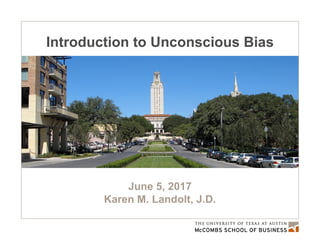
Introduction to unconscious bias
- 1. Introduction to Unconscious Bias June 5, 2017 Karen M. Landolt, J.D.
- 2. Learning Objectives Understand two assumptions: 1. Most people want to do the right thing 2. Economic actors can choose the proper ethical path when they put their minds to it (act intentionally) Understand heuristics – what they are and how they can impede ethical decision-making Learn how to rationally recognize and resolve ethical dilemmas Recognize limits in our decision-making and judgment processes that might lead to unethical decisions without full realization
- 3. Heuristics = mental shortcuts used to ease the cognitive load of making a decision. “rule of thumb,” “educated guess,” “common sense,” “intuition” Moral Heuristics
- 4. Limitations of Human Judgment Beware of the following traps that can impede ethical decision making
- 5. Biases: Obedience to Authority Egil “Bud” Krogh – the Head “Plumber” in the Watergate scandal, didn’t question if it was wrong – it was just what the President wanted.
- 6. When you are the boss, do you get to define ethical behavior? Biases: Obedience to Authority
- 7. E is the experimenter, S is the subject (at the controls of the electronic apparatus, and A is the confederate (actor) responding to the actions of S. The mental anguish suffered by subjects of the Milgram experiment is sometimes cited as a reason why American universities instituted strict controls on experiments involving human subjects. The Milgram Experiment
- 8. Confirmation Bias Our own tendency to choose evidence that supports our existing beliefs. We seek out confirmation whilst avoiding anything that detracts from our belief.
- 9. Confirmation Bias “What the human being is best at doing is interpreting all new information so that their prior conclusions remain intact.” — Warren Buffett
- 10. Confirmation Bias Willard V Quine and J.S. Ullian: …The desire to have been right…is the pride that goeth before a fall. It stands in the way of our seeing we were wrong, and thus blocks the progress of our knowledge.
- 11. Overconfidence 68% of the faculty at the University of Nebraska rated themselves in the top 25% for teaching ability. 93% of U.S. students estimated themselves to be “above average” drivers. 84% of Frenchmen estimate that they are above-average lovers I am more ethical than my peers = 85%
- 12. Huff Post: Test Your Overconfidence As noted by Andrew Macken, a senior analyst at Montgomery Investment Management, Michael Mauboussin, author of The Success Equation, has posted an online test that permits you to assess your own level of confidence. Macken indicates that more than 700 people have taken this test. Their accuracy rate in responding to the questions posed is 60.5 percent, but their confidence level is 70 percent. http://confidence.success-equation.com/
- 13. Rationalization "Rationalization" is a backward flow from conclusion to selected evidence. describe something in a way that explains it and makes it seem proper
- 15. Self-Serving Bias Tendency to accept that which helps us and reject that which hurts us We look for examples that reinforce our beliefs
- 16. Self-Serving Bias We tend to attribute their successes to dispositional factors, and their failures to situational factors. For example: “I did well on the test because I am smart,” “I did poor on the test because I didn’t get enough sleep.
- 17. Cognitive Dissonance We don’t like inconsistency or contradictions.
- 18. Loss Aversion Famous Serena Williams Quote:
- 19. Loss Aversion We don’t like to let go of our stuff ex: paying to store stuff you don’t even use. People like making money, but they HATE losing money
- 20. Misjudging effect of situational factors Fundamental Attribution Error
- 21. Dishes: A Tale of Two Roommates
- 22. Think about a time you succumbed to Fundamental Attribution Error. Jot down your thoughts. Turn to your neighbors and discuss. What are questions you could ask yourself or someone else before committing this error? Pre-Scripting
- 23. Action: Develop a Moral Identity
- 24. Monitor Your Own Overconfidence
- 25. Denial of responsibility Denial of injury Denial of victim Monitor Your Own Rationalizations
- 27. Ethical Pre-Scripting To whom am I responsible? For what am I responsible? What is fair treatment of stakeholders? What are the minimum responsibilities? What are the ideal role expectations? *Q’s from Markkula Center for Applied Ethics
- 29. Advocating Effectively Offer viable solutions
Editor's Notes
- https://www.farnamstreetblog.com/2017/05/confirmation-bias/?utm_source=CreativeMornings+HQ+%F0%9F%91%8B&utm_campaign=fc32de13c1-EMAIL_CAMPAIGN_2017_04_24&utm_medium=email&utm_term=0_1768cc808f-fc32de13c1-323268945&mc_cid=fc32de13c1&mc_eid=91c20746e9 Confirmation Bias Article with Probing Questions at the end.
- https://www.farnamstreetblog.com/2017/05/confirmation-bias/?utm_source=CreativeMornings+HQ+%F0%9F%91%8B&utm_campaign=fc32de13c1-EMAIL_CAMPAIGN_2017_04_24&utm_medium=email&utm_term=0_1768cc808f-fc32de13c1-323268945&mc_cid=fc32de13c1&mc_eid=91c20746e9 The Web of Belief (Philosophy & Religion) 2nd Edition by W. V. Quine (Author), J. S. Ullian (Author)
- https://www.psychologytoday.com/blog/the-art-thinking-clearly/201306/the-overconfidence-effect UT ethical quiz = http://news.utexas.edu/2014/09/22/how-ethical-are-you-test-your-decision-making-skills
- Huffington Post article on Overconfidence: http://www.huffingtonpost.com/dan-solin/this-test-proves-youre-ov_b_7482810.html Do you know what you know quiz = http://confidence.success-equation.com/